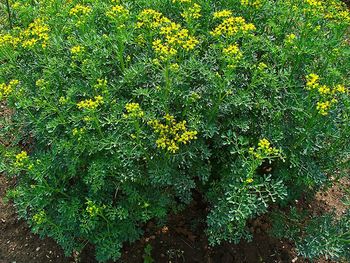Rue Essential Oil
Other Names : Common Rue, Ruta graveolens, Rue officinale, Rue des jardins, Rue fétide, Weinraute, Wijnruit, Arruda, rue, common rue or herb-of-grace
Rue is native to the Mediterranean and grows wild across the region. It is mainly cultivated for its oil in France, Italy, Spain, and Yugoslavia. There are various forms of Rue essential oil, none of which should be used in aromatherapy. Besides R. graveolens, the Sardinian or North African rue (R. angustifolia); summer or Spanish rue (R. montana); and winter or Sicilian rue (R. chalepensis or R. bracteosa); also produce essential oil. If this is not confusing enough, winter rue is also sometimes called North African rue like the Sardinian. The viscous oil is usually yellow or orange and solidifies at room temperature. This is one way to tell the oils apart. Winter rue doesn’t harden in the same way. R. graveolens is sometimes referred to as herby grass, herb-of-grace, mother of the herbs, and garden rue, among others. It is said that those who smell the fresh leaves of the plant will remember it for life since it smells that bad. Dehydrated leaves are not so horrible-smelling because the volatile oils have dissipated and taken the stench with them.
Special Precautions of Rue Essential Oil
Today, the rue plant benefits are overshadowed by its dangers. This oil should not be used under any circumstance in aromatherapy, whether for a kid’s blend or an adult’s. Using this plant or its oils for medicinal purposes in an uncontrolled setting can cause great harm and loss of life. The side effects and dangers of using Rue essential oil far outweigh the benefits.
- The plant’s main constituent is 2-Undecanone, or methyl nonyl ketone. This chemical causes eye, skin, digestive and respiratory tract irritation and is combustible.
- Because the oils present in the leaves can cause a skin rash, care must be taken to use the plant in this manner.
- Animal lovers should be careful, too. Rue keeps cats away from the garden, but it is toxic to these curious creatures.
- Rue is an abortifacient. It can cause uterine contractions and should not be used under any circumstance by a pregnant woman or anyone breastfeeding as it could harm the baby.
- Even though it has been used for gastrointestinal (GI) issues, it can make these problems worse.
The oil can hurt the kidneys and urinary system.
- Existing liver problems can be worsened by its use.
- Rue essential oil irritates mucous membranes. It can cause severe rashes when used on the skin and is phototoxic, meaning it can increase a person’s sensitivity to the sun.
- Besides all of that, other side effects include dizziness, sleeping problems, changes in mood, spasms and in severe cases, death.
Health benefits and Uses of Rue Essential Oil
Rue oil should not be used for any reason. Nevertheless, the R. graveolens plant has been used in many interesting ways throughout history:
- The herb itself was used in fighting off contagions like the plague.
- Dioscorides believed that weasels ate the leaves of the herb before fighting snakes, so he recommended it for snakebites in his de Materia Medica.
- It was used as an antidote for poisons.
- The plant was an ingredient for exorcisms in Medieval times.
- Poultices were made from the fresh leaves to be used on cuts.
- Even though it was believed that witches used the plant for its hallucinogenic effects, rue was often used as protection against witchcraft and to ward off evil spirits. It is also said to remove a werewolves’ power.
- Women used to drink rue tea, also known as ‘ruta tea,’ to terminate unwanted pregnancies.
- Herbalists throughout history have used the plant in many ways to heal various ailments, such as a sedative as well as for:
- Easing colic
- Treating skin inflammation
- Soothing earaches
- Relieving menstrual problems
- Inducing abortion
- Nervous afflictions
- Digestion problems
- Circulatory issues
- Breathing problems like coughing and pain from pleurisy
- Headache
- Muscle spasms
- The herb was also thought to help eyesight. Michelangelo and Davinci were said to have chewed on the leaves in an effort to improve both their sight and creativity.
- Insect Repellant : Gardeners know that one of the rue plant benefits is to keep insects at bay, including fleas, flies, Japanese beetles, mosquitos, and slugs.
- There have been a few studies trying to determine the efficacy of rue essential oil for other uses.
- Antifungal and Herbicide : Tunisian rue was studied in 2015 to see its effects on 10 pathogenic plant fungi. It was determined that rue oil made from harvesting the herb at the flowering phase showed the highest levels of antifungal activity.
- The researchers also determined that the essential oil was an effective herbicide against a variety of weeds.
- Colorectal Cancer : In a study in Italy in 2011, 56 patients with colon cancer at various stages were given an extract of R. chalepensis. It was determined that the extract helped to protect red blood cells from oxidation. This was especially apparent in the earlier stages of the cancer. The findings show promise for using the herb’s properties to slow tumor growth, but more studies need to be done.
